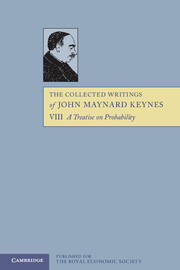Book contents
- Frontmatter
- Contents
- General Introduction
- Editorial Foreword by R. B. Braithwaite
- Editorial Note
- Preface to the First Edition
- I FUNDAMENTAL IDEAS
- II FUNDAMENTAL THEOREMS
- III INDUCTION AND ANALOGY
- IV SOME PHILOSOPHICAL APPLICATIONS OF PROBABILITY
- V THE FOUNDATIONS OF STATISTICAL INFERENCE
- 27 THE NATURE OF STATISTICAL INFERENCE
- 28 THE LAW OF GREAT NUMBERS
- 29 THE USE OF A PRIORI PROBABILITIES FOR THE PREDICTION OF STATISTICAL FREQUENCY—THE THEOREMS OF BERNOULLI, POISSON, AND TCHEBYCHEFF
- 30 THE MATHEMATICAL USE OF STATISTICAL FREQUENCIES FOR THE DETERMINATION OF PROBABILITY A POSTERIORI—THE METHODS OF LAPLACE
- 31 THE INVERSION OF BERNOULLI'S THEOREM
- 32 THE INDUCTIVE USE OF STATISTICAL FREQUENCIES FOR THE DETERMINATION OF PROBABILITY A POSTERIORI—THE METHODS OF LEXIS
- 33 OUTLINE OF A CONSTRUCTIVE THEORY
- Bibliography
- Index
29 - THE USE OF A PRIORI PROBABILITIES FOR THE PREDICTION OF STATISTICAL FREQUENCY—THE THEOREMS OF BERNOULLI, POISSON, AND TCHEBYCHEFF
from V - THE FOUNDATIONS OF STATISTICAL INFERENCE
Published online by Cambridge University Press: 05 November 2012
- Frontmatter
- Contents
- General Introduction
- Editorial Foreword by R. B. Braithwaite
- Editorial Note
- Preface to the First Edition
- I FUNDAMENTAL IDEAS
- II FUNDAMENTAL THEOREMS
- III INDUCTION AND ANALOGY
- IV SOME PHILOSOPHICAL APPLICATIONS OF PROBABILITY
- V THE FOUNDATIONS OF STATISTICAL INFERENCE
- 27 THE NATURE OF STATISTICAL INFERENCE
- 28 THE LAW OF GREAT NUMBERS
- 29 THE USE OF A PRIORI PROBABILITIES FOR THE PREDICTION OF STATISTICAL FREQUENCY—THE THEOREMS OF BERNOULLI, POISSON, AND TCHEBYCHEFF
- 30 THE MATHEMATICAL USE OF STATISTICAL FREQUENCIES FOR THE DETERMINATION OF PROBABILITY A POSTERIORI—THE METHODS OF LAPLACE
- 31 THE INVERSION OF BERNOULLI'S THEOREM
- 32 THE INDUCTIVE USE OF STATISTICAL FREQUENCIES FOR THE DETERMINATION OF PROBABILITY A POSTERIORI—THE METHODS OF LEXIS
- 33 OUTLINE OF A CONSTRUCTIVE THEORY
- Bibliography
- Index
Summary
Hoc igitur est illud Problema, quod evulgandum hoc loco proposui, postquam jam per vicennium pressi, et cujus turn novitas, turn summa utilitas cum pari conjuncta difEcultate omnibus reliquis hujus doctrinae capitibus pondus et pretium superaddere potest.
Bernoulli.1. Bernoulli's theorem is generally regarded as the central theorem of statistical probability. It embodies the first attempt to deduce the measures of statistical frequencies from the measures of individual probabilities, and it is a sufficient fruit of the twenty years which Bernoulli alleges that he spent in reaching his result, if out of it the conception first arose of general laws amongst masses of phenomena, in spite of the uncertainty of each particular case. But, as we shall see, the theorem is only valid subject to stricter qualifications, than have always been remembered, and in conditions which are the exception, not the rule.
The problem, to be discussed in this chapter, is as follows: Given a series of occasions, the probability of the occurrence of a certain event at each of which is known relative to certain initial data h, on what proportion of these occasions may we reasonably anticipate the occurrence of the event? Given, that is to say, the individual probability of each of a series of events à priori, what statistical frequency of occurrence of these events is to be anticipated over the whole series? Beginning with Bernoulli's theorem, we will consider the various solutions of this problem which have been propounded, and endeavour to determine the proper limits within which each method has validity.
- Type
- Chapter
- Information
- The Collected Writings of John Maynard Keynes , pp. 369 - 399Publisher: Royal Economic SocietyPrint publication year: 1978

